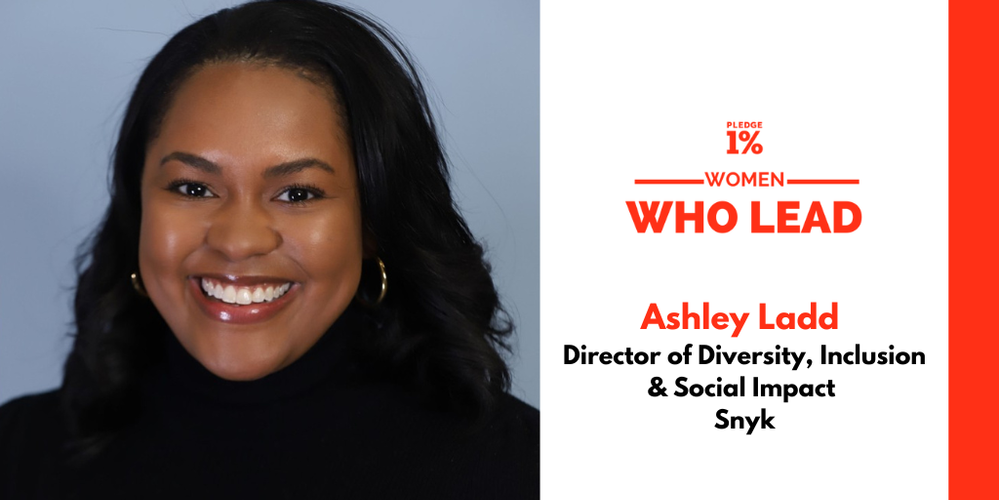
Ashley Ladd
Director of Diversity, Inclusion & Social Impact, Snyk
Boston, MA
If you could describe yourself in one word, what would that be and why?
Ambitious. My mom instilled in me at a young age to be curious, hard-working, and kind to everyone. She led by example in so many ways and it showed me that anything is possible when you put your mind to it. I take these lessons with me in all that I do, both personally and professionally.
Pledge 1% provides a framework for businesses to do good. Do you think it’s important for today’s corporate leaders to prioritize social impact? If so, why?
It’s incredibly important for leaders today to advocate for and prioritize social impact throughout their organization. Not only is it good for business but it’s a great way to pay it forward, maximize impact globally and ensure we’re taking care of the communities where we live and work.
Do you give back to the community with your team and work? If so, what does this look like?
Snyk has a wide array of Social Impact programs that run each year but one of our most impactful programs is our Snyk Week of Impact. As a company, we commit to participating in volunteer opportunities across the globe within one week to increase our impact exponentially. From renovating a school and street outreach to support the homeless to packing meals and cleaning up a community center our Snykers work together as One Team to leave a lasting impact.
What’s the best piece of advice you’ve ever received?
“When people show you who they are, believe them.” – Maya Angelou
This year’s International Women’s Day themes are focused on investing in women and inspiring inclusion. What can we do to make today’s workplaces more equitable and inclusive for women?
Creating more equitable and inclusive spaces for women begins with community and conversation. We need to ensure we’re having conversations about equal pay, promotions, and career growth, and doing so throughout the organization. From Employee Resource Groups to Leadership, these conversations need to happen often and include everyone.
What advice do you have for women who are just starting their career?
You may not know exactly what you want your career to be (and that’s ok!).
“Be intentional about deepening your understanding and skillset in the areas that will help you get that dream job. Lean in and take risks where you can – it will always be a great learning experience.”
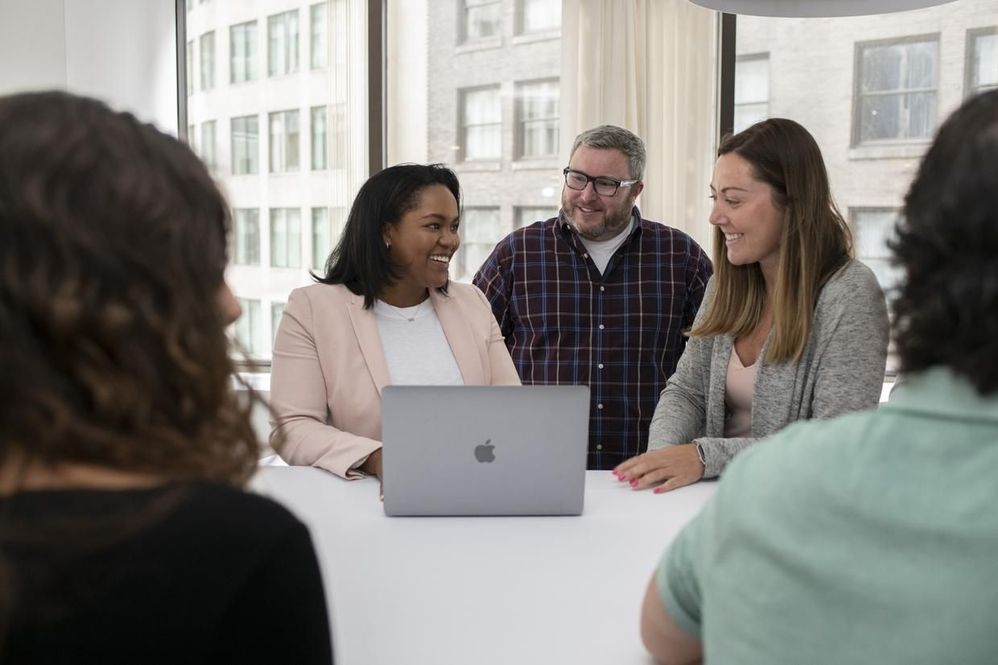
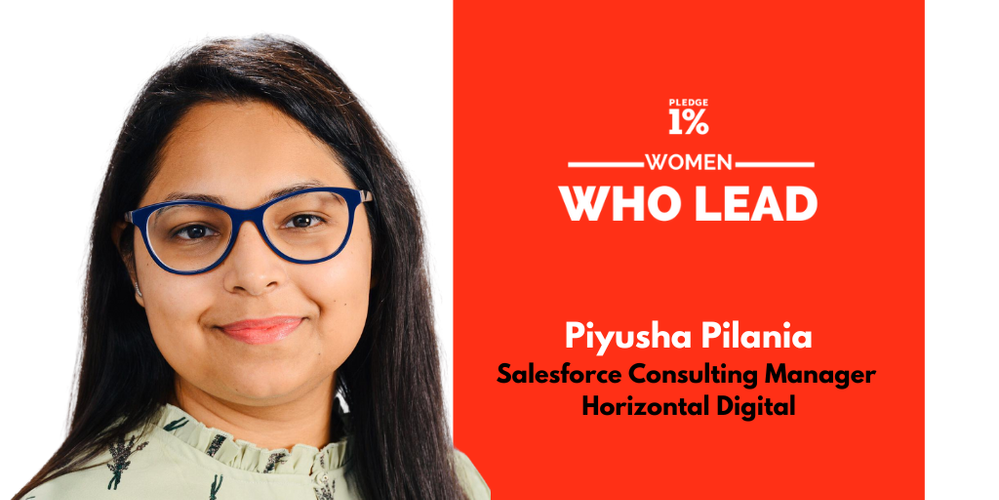
Piyusha Pilania
Salesforce Consulting Manager, Horizontal Digital
Vadodara, India
If you could describe yourself in one word, what would that be and why?
Resilience. I come from a very traditional Rajasthani family where girls are married as soon as possible, I was married at the age of 20 during my bachelor’s degree. I trained to be a housewife and dedicate my life towards family. But I wanted to do something to change this narrative, I built a career for myself and now I’m helping other females in the villages of Rajasthan to stand on their feet and have a career of their own.
Pledge 1% provides a framework for businesses to do good. Do you think it’s important for today’s corporate leaders to prioritize social impact? If so, why?
Leaders need to put social impact high on their list of priorities because it’s all about making a real difference in the world. By focusing on social initiatives, we can grow together in a way that includes everyone. These efforts are crucial for lifting up communities that might be struggling financially or facing other kinds of challenges. It’s about bringing people together from all walks of life and making sure everyone has a fair shot.
Do you give back to the community with your team and work? If so, what does this look like?
I love giving back, both on my own and alongside my team. Personally, I lead workshops in Rajasthan’s rural villages to inspire and empower women through education. I’m also deeply involved in organizing Salesforce events and mentorship programs, all aimed at empowering our youth with the skills they need for the future. Together with my team, we reach out to schools in underprivileged areas, donating essential school supplies and sharing a glimpse into the corporate world. Plus, we each get some time off every year to volunteer for a cause that’s close to our hearts.
What’s the best piece of advice you’ve ever received?
When I got married, I remember telling my teacher I thought I’d end up being a housewife forever because having a career seemed like an impossible dream. But she gave me some life-changing advice. She said, “You won’t know unless you try.” So, I took her words to heart, and look where I am now—balancing life as a mom and a wife, all while nurturing my career.
This year’s International Women’s Day themes are focused on investing in women and inspiring inclusion. What can we do to make today’s workplaces more equitable and inclusive for women?
One simple yet powerful idea is to start mentorship programs specifically designed for women. By pairing up-and-coming female professionals with seasoned leaders, we can create a supportive environment that not only nurtures their growth but also paves the way for a more inclusive culture. It’s about giving women the tools, confidence, and network they need to shine.
Another idea is to create a nurturing environment for new mothers in the workplace. They’re already on the incredible journey of caring for a little one, and having the support of their team can make all the difference.
“Imagine flexible working hours, dedicated mother’s rooms for privacy, and a culture that truly understands the balance between work and family life. It’s about showing new moms that they’re valued not just as employees, but as whole people taking on one of life’s most beautiful challenges.”
What advice do you have for women who are just starting their career?
You are no way less than the opposite gender so you need to overcome the imposter syndrome and grab the opportunities to progress in your career. Support other females as much as you can this camaraderie can help us grow significantly.
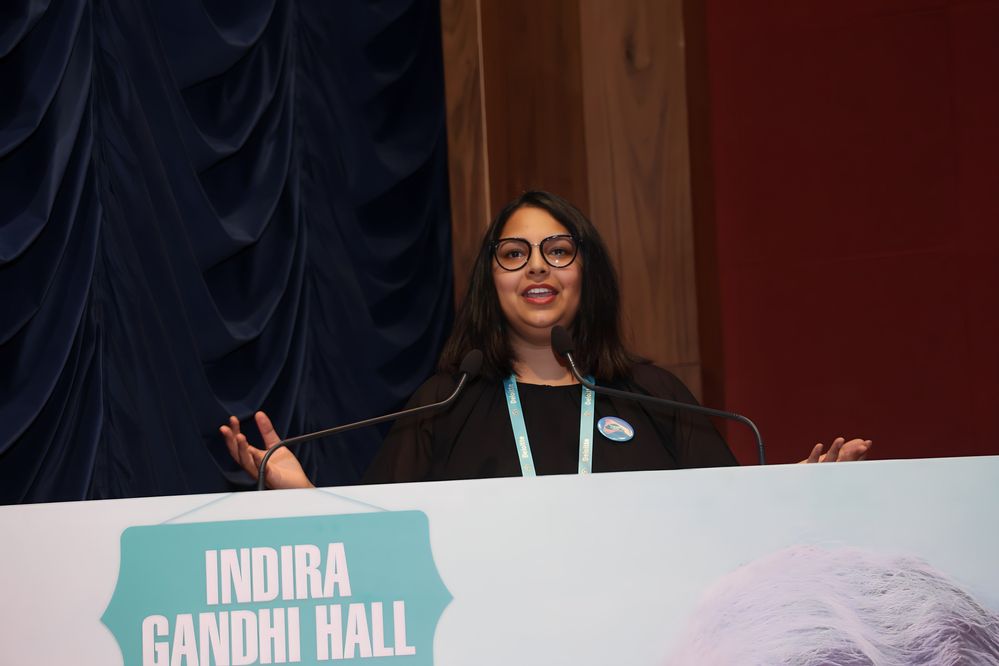
What are you looking forward to this year? Are there any goals (personal or professional), activities, or experiences you are excited about?
This year is already looking so bright, I have already presented a session at Philippines Dreamin, and I have started my new role this month onwards. For the upcoming months, I plan on getting some new certifications to upskill myself, run some more bootcamps, present a session at Dreamforce and organize at least one speed mentoring session each month.
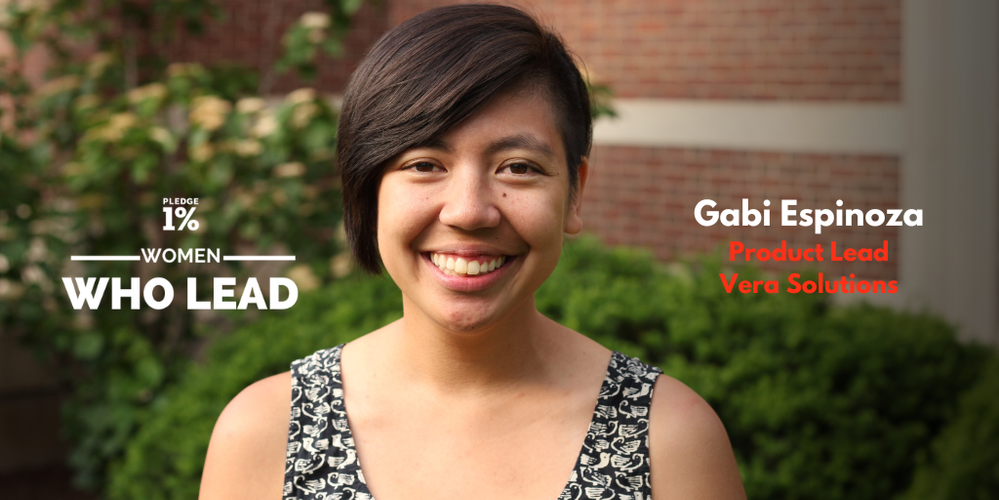
Gabriella (Gabi) Espinoza
Product Lead, Vera Solutions
Mumbai, India / Seattle, USA
If you could describe yourself in one word, what would that be and why?
Open. Whether it’s my mindset or my metaphorical door, I believe it’s crucial to create a space in which my teammates can feel comfortable to honestly share whatever is on their mind. My primary goal in leadership is to ensure my teammates feel empowered to navigate whatever challenge they face and to share whatever feedback they have.
Pledge 1% provides a framework for businesses to do good. Do you think it’s important for today’s corporate leaders to prioritize social impact? If so, why?
I think it’s absolutely important for corporate leaders to prioritize social (and, for that matter, environmental) impact. We have enough data now to fully understand the repercussions of business on both people and environment, whether from the supply chain, energy consumption, etc. With that knowledge, it’s imperative to continuously improve the role that business plays in society and in the environment.
What’s the best piece of advice you’ve ever received?
When I was early in my career doing admin at a nonprofit and feeling like I was falling behind my former university classmates, my manager comforted me by telling me that even she was still figuring her life out. Something clicked for me immediately to stop comparing myself with where my peers are at, and to simply forge ahead with what I want to achieve in life.
This year’s International Women’s Day themes are focused on investing in women and inspiring inclusion. What can we do to make today’s workplaces more equitable and inclusive for women?
First, we need greater intersectionality in DEI initiatives. By that, I mean we to increase visibility for women of color, transgender and nonbinary women, women from historically disenfranchised communities, and so forth. As Maya Angelou famously said, “The truth is, no one of us can be free until everybody is free.” It is every woman’s responsibility to work towards the equity and inclusion for all other women.
Second, I think it’s important to not ignore the role that men have to play in driving equity and inclusion. They also have the responsibility for making space for women to contribute and participate at the workplace, where women may otherwise not be present. Whether that’s actively sponsoring women to have a seat at the table or simply examining one’s own implicit biases, all of it helps to drive us towards greater equity and inclusion.
What advice do you have for women who are just starting their career?
Whatever you think you deserve in your career, you probably deserve more. I personally have struggled with low expectations of myself despite being a generally high-achieving person. It took a lot of mentorship and external validation before I fully started to comprehend what I deserve – and then to be able to actually ask for that.
“So whatever you think you deserve, wherever you think you’re at – be bold and ask for it.”

Jessica Shor
General Counsel, Contentstack
Golden, USA
If you could describe yourself in one word, what would that be and why?
Tenacious. I don’t believe in giving up or failure if it’s at all in my control. I also love solving problems even when they are outside of my “lane”. I once had a competitors offices raided by the Czechia police for theft of our IP. For me it comes down to fairness and equality, and I believe taking competitive information isn’t fair.
Pledge 1% provides a framework for businesses to do good. Do you think it’s important for today’s corporate leaders to prioritize social impact? If so, why?
Absolutely. I believe it’s critical for all individuals and organizations to do their part for equality, especially in our society today where we are so divided.
“Giving back and showing employees, customers and prospective employees that social impact is a critical part of who we are as an organization helps us keep growing our incredible culture and support our community.”
Do you give back to the community with your team and work? If so, what does this look like?
100%. For me, I live in Colorado and we have a group of employees here across different departments. We try to get together once a month and volunteer. We usually go to food for thought where we pack lunches for kids who might not otherwise have food for the weekend. It’s a great and easy way for us to come together and give back, especially in a remote environment. It’s nice to be able to get together.
What’s the best piece of advice you’ve ever received?
If someone is willing to give you feedback, it means they care so thank them.
This year’s International Women’s Day themes are focused on investing in women and inspiring inclusion. What can we do to make today’s workplaces more equitable and inclusive for women?
I’m the executive leader for our women’s ERG and I’m bringing in an amazing speaker and friend to talk to women about financial independence, negotiating for themselves and the value of equity.
What advice do you have for women who are just starting their career?
Always advocate for yourself. Decisions are made about you in rooms you aren’t in so you need to be your biggest champion.
What are you looking forward to this year? Are there any goals (personal or professional), activities, or experiences you are excited about?
Being more mindful with my time, body and family.

Original post here.
Author: Reddit
We proudly announce that today Reddit has joined Pledge 1% to help support and grow communities that are driving social good online and in real life. Pledge 1% is a nonprofit and global movement of over 18,000 companies in 100 countries that inspires, educates, and empowers every entrepreneur, company, and employee to be a force for good.
We believe that Reddit is one of the most human places on the internet. Our communities play an impactful role in driving change and building a better future. Since Reddit’s founding, we have seen how communities create a positive impact and take action for the causes they believe in. From organizing local trash cleanups, raising donations for food banks and conservation funds, hosting an art gallery exhibition promoting local artists, printing redditor usernames on a Talladega racecar for a “ride-along” experience, and sending care packages to healthcare workers, communities are continuing to change the world every day.
“Communities play a special role in enabling human virtues and bringing more good in the world,” said Steve Huffman, Reddit CEO. “I’m constantly inspired by the creativity of Reddit users and communities. I’m excited to see people continue to do incredible things with support from our Pledge 1% commitment.”
Joining Pledge 1% means making a long-term commitment to reserve 1% of our common stock over 10 years to fund community-related programs. This commitment allows us to continue supporting the positive impact of our communities and investing in new opportunities that align with our mission to bring community, belonging, and empowerment to everyone in the world. We will also be able to build upon our one-of-a-kind Community Funds program that gives real people funding to bring community ideas and passions to life.
“Reddit is a community of communities, and we have seen firsthand the positive real-world impact that people have when empowered with the right resources,” said Roxy Young, Chief Marketing and Consumer Experience Officer at Reddit. “By joining Pledge 1%, we will further activate our communities in meaningful ways to help advance their interests and reach their impact potential.”
“As a business focused on empowering communities, Reddit is successfully integrating social impact into their business in a way that’s aligned with their values,” said Amy Lesnick, CEO of Pledge 1%. “This makes Reddit an incredibly important role model for other companies as we strive to transform the default DNA of every company to have social impact ingrained.”
We are thrilled to join a global network of companies that support the social good of communities today and tomorrow. We look forward to sharing more about how we are funding community-related initiatives that align with Reddit’s Community Values and empower people to do even more.
About Pledge 1%
Pledge 1% is a nonprofit and global movement that inspires, educates, and empowers every entrepreneur, company, and employee to be a force for good. Over 18,000 companies in over 100 countries around the world have taken the pledge and used Pledge 1%’s flexible framework to build their social impact programs. To learn more about Pledge 1%, and how your company can get involved, visit pledge1percent.org.
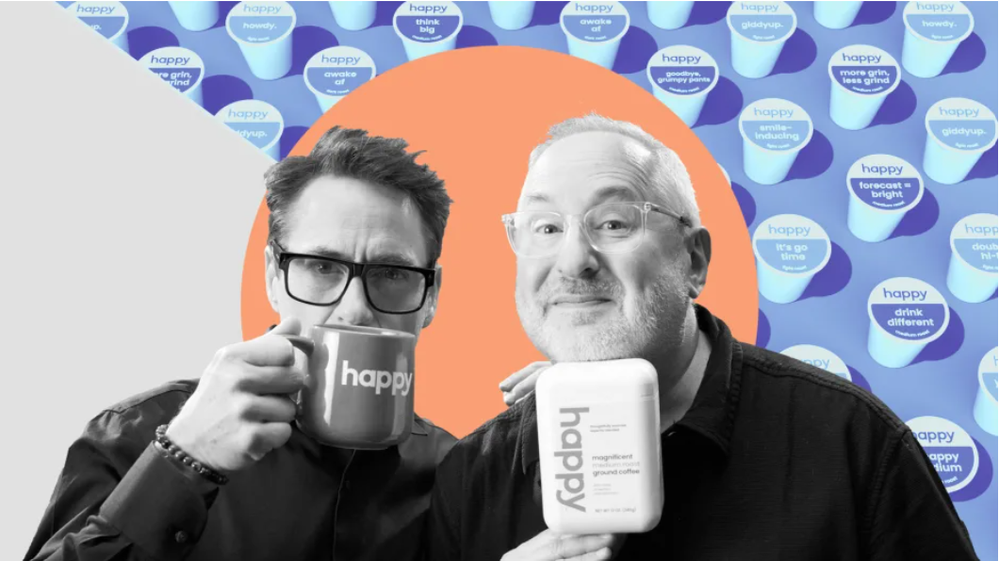
Author: Stephanie Mehta
Originally posted here.
When serial entrepreneur Craig Dubitsky (Hello Products, EOS) was developing Happy, his new coffee company, he says he also wanted to reinvent the relationship between entrepreneurship and philanthropy. Rather than making a one-time gift to a charity or even donating proceeds from every purchase to a nonprofit, he and cofounder Robert Downey Jr. decided to grant an undisclosed equity stake in Happy to the National Alliance on Mental Illness (NAMI), a grassroots organization that helps individuals and families affected by mental health conditions.
“We thought, ‘What can we do that’s relevant culturally and socially, and do it in a way that hopefully is as endearing as it is enduring?’” Dubitsky tells Modern CEO. “This was a big idea around what we like to think of as emotional innovation, which is focused on meaningful human connection.”
GIVING BACK WITH EQUITY
Dubitsky and Downey join the ranks of hundreds of tech startup founders who have given away part of their companies to philanthropic causes. Pledge 1%, a 10-year-old nonprofit, helps companies and founders donate 1% of their time, products, profits, or equity to social impact initiatives. Of the 18,000 companies that have made a pledge, about 10% have pledged to grant equity in their companies. Organizations that have set aside equity to fund their social impact programs include Airbnb, DocuSign, PagerDuty, and Slack. Pledge 1% says, thanks to equity set asides, more than $2 billion in new philanthropy has been earmarked in recent years.
Pledge 1% has helped make the process more turnkey for founders—it has worked with law firms, for example, to create documents to facilitate equity set asides—and it has created frameworks and talking points to make equity grants more palatable to boards and investors, who may object to dilution of their shares.
A POWERFUL COMMITMENT
Jan D’Alessandro, chief legal and philanthropy officer at Pledge 1%, says equity grants are a powerful way of signaling to employees, customers, and partners “that we are a company that cares about giving back.”
For NAMI, being on Happy’s cap table—or list of owners—is just one of the benefits of its partnership with the company. Each container of Happy coffee has a QR code that links to the NAMI website. “While the opportunity of equity revenue is exciting and groundbreaking, I also understand, beyond the financial, the undisputable value of this partnership is the idea that so many people are going to learn for the first time about NAMI and available mental health resources,” says Jessica Edwards, NAMI’s chief development officer.
“The partnership is emotional and authentic, not just transactional.”

Originally posted here.
Author: Navanwita Sachdev, Hindustan Times
In recent years, you must have heard of Environmental, Social, and Governance (ESG) and how companies are embracing ESG principles. If you think this trend is just a corporate one, think again. ESG has direct implications for consumers, moulding purchasing decisions and creating a more sustainable and ethical marketplace. Moreover, in this digital age with all information at our fingertips, ESG principles are converging with technology to transform the consumer landscape in India.
Recent reports show that ESG investments in India have increased from US$330 million in 2019 to US$1.3 billion in 2023, proving the significance of ESG. Companies need ESG not just to cater to the consumer; investors are duly interested in companies with ESG-focused practices, because the resulting regulatory intervention can ensure investor protection. In May 2021, the Securities Exchange Board of India (SEBI) introduced the Business Responsibility and Sustainability Reporting framework, ensuring that certain listed companies must disclose their ESG related information.
According to a study by Avendus Capital, India’s ESG is expected to contribute to nearly 34% of total domestic AUM by 2051, which is in sync with India’s 2070 Net-Zero target.
Why should the Indian consumer care about ESG and how is technology playing a role in the integration of ESG practices within India’s business ecosystem?
Jitesh Shetty, Founder and CEO of Credibl, a sustainability tech company and Qwiklabs Inc., which was acquired by Google, says while India is doing well with regard to ESG, we do have a long way to go. ?India is doing very well when you look at regulations like BRSR reasonable assurance, we are quite ahead of the curve here from the rest of the world,? says Shetty. ?But also, our problems are large-scale problems and hence we have a long way to go.?
He cites the example of TATA Sons, which is a leader in sustainability, and their company IHCL, the Taj hotel group, which is doing well with ESG KPIs.
They deeply care about ESG and don’t do this because someone is policing. Their program called PAATHYA has a huge consumer mindshare. You walk into any Taj hotel and you will see the impact PAATHYA is having,? he explains.
We are on WhatsApp Channels. Click to join.
Why Consumers Should Care?
ESG is a set of standards that investors, companies, and consumers practice to appraise how a company impacts the environment, society, and its governance structure. Why should consumers think of ESG or things like digital footprint when they buy a product or service? As consumers become more socially and environmentally conscious, they are increasingly seeking products and services that align with their values.
?This is a multi-front problem,? says Shetty. ?Corporates have to better their ESG posture. But consumers also have to do their part. Buying decisions can have a significant impact on the environmental footprint. For example, you are buying a home textile product. If it’s made from organic cotton, green energy is used in the factory and packaging is green. Then, the overall environmental impact will be very low.?
Digital Footprint and Environmental Impact
If we look at the Indian market, it’s flooded with digital products and services, and the Indian consumer is aware of the environmental implications of this digital transition. E-waste, energy consumption, and sustainable data management practices are, slowly but steadily, becoming part of household discussions.
For instance, digital giant Google’s commitment to operate on 100% renewable energy since 2017, is an announcement that environmentally conscious consumers took notice of. Closer to home, the Mumbai-based RPG Group, has vowed to conserve, restore, and grow a million trees by 2030 with 1t.org, a Geneva- based World Economic Forum platform that wants to rally a global reforestation community that grows and looks after a trillion trees worldwide by 2030.
As issues like climate change and global warming become more and more pressing, consumers in India are starting to pay more attention to a company’s environmental practices. From carbon footprint to waste management, they are starting to read the labels for the products and services they buy. For proof, just look at the arrival of electric car giant Tesla in India. Tesla is banking on the environmental aspirations of Indian consumers to own a vehicle that is climate friendly.
Social Responsibility in the Digital Realm
The digital space, where we interface every single day of our lives with various digital entities, is a prominent platform where companies can learn about what consumers care about.
At the same time, they can showcase their own commitment to social responsibility, which can include aspects from fair labour practices in tech supply chains to diversity and inclusion initiatives in digital workplaces.
For example, when cloud company Salesforce announced its Pledge 1% initiative to donate 1% of its product, equity, and employee time, it inspired many other companies to follow suit.
Governance in the Digital Age
With the rise of cyber threats and data privacy concerns, digital governance is not something consumers can ignore. Already, what’s being called ?the mother of all breaches’ just occurred a few days ago, revealing 26 billion records, which includes popular and regular sites like LinkedIn, Snapchat, Venmo, Adobe, and X. This is why consumers now look for companies with robust cybersecurity measures, transparent data practices, and ethical usage of technology.
While international tech giants like Apple and Microsoft are known for their digital ethics approach, in India, IT giant Infosys, has been recognized for its robust governance framework.
Last year, Infosys Co-founder Nandan Nilekani, spoke about how ESG not only builds trust but also elevates brand value.
“A commitment to strong governance is not just a matter of compliance; it’s a strategic imperative for sustainable success in the dynamic world of startups,” he said.
Technology’s Role in Advancing ESG in India
Significant as ESG is, technology has been aiding the sector, so that organizations can integrate ESG principles in their functions as much as possible. How is technology enabling ESG in the Indian landscape? Will it get better in the future?
?Technology across raw materials, energy sources and software is helping,? says Shetty. ?Innovation in materials is where you can take organic fibre but make it durable for real world use, efficiently use solar energy in manufacturing and then use software for better traceability and ESG data management with automation.?
Some key ways in which technology is aiding the adoption of ESG practices are as follows:
Data analytics: With copious amounts of data related to their ESG performance, organizations are able to analyze, find patterns, and identify the do’s and don’ts in their structure. This helps decide the future courses of action that are environment and society friendly.
As Nitesh Mehrotra from business consulting firm EY India says, ?ESG today is a focused boardroom agenda for all leading enterprises to create and protect value. And I think it is very critical to have consistent and comparable scientific measurement of sustainability variables across all our stakeholders. So, clearly, there is a critical need to have a single version of truth with near to real time performance analytics to create actionable insights.?
It’s imperative that this data be shared with consumers, and that consumers themselves demand it from companies, in order to help them make more conscious purchasing decisions.
Blockchain for transparency: An emerging technology that can increase transparency in ESG is blockchain. Its ledger technology allows companies to provide consumers with real-time information about the origin, production processes, and ethical practices applied in their products and services.
ESG rating platforms: Technology has given rise to ESG rating platforms, like MSCI, Sustainalytics, and Bloomberg ESG, which evaluate and score companies based on their ESG performance. Anyone, investor or consumer, can access these platforms to make informed decisions, influencing companies to improve their ESG practices.
The Path Forward
As the influence of ESG on Indian consumers continues to grow, the onus is on businesses to embrace sustainable and ethical practices. Companies that prioritize ESG considerations not only contribute to a better planet and society but also gain a competitive edge in the evolving marketplace.
?When you start with ESG at the core it makes that a differentiator in the marketplace. Also, you start with a green foundation,? advises Shetty.
He also adds that ESG can lead to a more equitable society, ?In India, citizens face significant environmental concerns on a daily basis. The air quality in all tier-1 cities is bad. Waste management is not streamlined and solved yet. When it comes to social indicators, we are far from creating an equitable society. The same is true with corporate compliance and governance. ESG compliance can help address all these issues.?
As consumers, the power to drive positive change lies in your purchasing decisions. By choosing products and services from companies that uphold ESG principles, you can become a part of the sustainable and socially responsible business environment. As technology helps in advancing ESG practices, going ahead, you’re likely to see even more transparency and accountability in the products and services you choose, ultimately shaping a more conscious and responsible marketplace in India.

Author: Fast Company Executive Board
Originally posted on Fast Company
As consumers become more focused on brands that practice corporate social responsibility, more and more companies are finding impactful ways to make a positive mark on their local communities. Forward-thinking businesses are spearheading work programs, offering financial assistance, and nurturing entrepreneurial talents in their neighborhoods.
Here, Fast Company Executive Board members discuss the strategies companies can adopt to contribute to their local communities in an impactful way. Follow their recommendations to create a lasting and meaningful change in your community beyond your bottom line.
1. ALIGN WITH ENVIRONMENTAL AND SOCIAL INITIATIVES.
Companies can establish impactful community engagement by aligning with local environmental and social initiatives. Fostering partnerships with entities that assist in reducing your environmental footprint not only aids in eliminating pollution but also actively contributes to the restoration and conservation of the local community and ecosystem. – Kenneth Svendsen, Oasis Marinas
2. OFFER PAID INTERNSHIPS.
Paid internships for different levels of skills and needs are certainly an option. Typically, we think of internships as an opportunity only for students. However, people in need financially or even who may be looking to develop real-world skills to make career transitions can benefit from short- or long-term paid internship opportunities. – Jeffery Keilholtz, Broadway Licensing Global
3. ENCOURAGE DAYS OF SERVICE.
The opportunity to impact local communities increases when you consider the rise in remote or hybrid work environments. With employees dispersed across regions and geographic locations, a day of service enables people to participate or get educated in local programs or band together for virtual activities or sponsorships that have more of a global impact. – Karen Budell, Totango
4. FORGE PARTNERSHIPS WITH EDUCATIONAL INSTITUTIONS.
Partnerships with local universities and technical institutes can allow a company to contribute to the local community while encouraging innovation and helping ensure a steady supply of skilled, engaged labor. Whether through research grants, internships, scholarships, or other development programs, collaboration between industry and education can help advance the goals of both institutions. – Mike Field, The Raymond Corporation
5. OFFER FREE MENTORING AND SKILL BUILDING.
In the creative field of advertising, social media, design, and digital design, an “agency or company” school that provides free mentoring and skill building is invaluable. It doesn’t require a college degree or even a high school diploma. Artistic ability comes from experience, building confidence at a young age, and stokes passion which is how best to build a career. – Peter Nicholson, Hill Holliday
6. CREATE AN ENTREPRENEURSHIP PROGRAM.
You can work with community leaders to create entrepreneurship programs, have workshops to train, coach people from the community on the value of innovation, and train them on technology. Help them build new skills. Work with small businesses and try to determine synergies among local small businesses to create an ecosystem for them to work together and collaborate to help each other. – Kaitki Agarwal, A5G Networks, Inc.
7. GET INVOLVED IN EVERY ASPECT.
We apply our time, talent, and treasure. For example, we donate over $60,000 in time to support nonprofits each year with the PR and marketing needed. We also have a volunteerism program that allows us to pick nonprofits in our community that need volunteers. Finally, we encourage our team to provide expertise by being on local boards, speaking at universities, and providing mentoring and internships. – Kathleen Lucente, Red Fan Communications
8. CREATE PARTNERSHIPS WITH LOCAL LEADERS.
Connect and speak with local government and NGO leaders. Offer special events for local entrepreneurs with heavy discounts, training, and quick-start engagement opportunities. It’s essential not to make assumptions about the local community’s needs. Engaging with the community on economic, entrepreneurial, and work empowerment opens up conversation and partnership opportunities with value for all. – Jimmie Lee, JLEE
9. HIRE FROM THE LOCAL COLLEGE COMMUNITY.
Hire from the local college community people hungry to learn your business. The investment is steep. You’ll need to spend the time and energy to train these people. They won’t have the business acumen of more senior hires. They’ll often go on to other companies, taking your insights with them. But this is an excellent way to help locals step into positions they otherwise would not have access to. – Robert Brill, Brill Media
10. ELEVATE YOUR EMPLOYEES TO MAKE AN IMPACT OUTSIDE OF WORK.
We make sure everyone has a professional development plan and that whatever limitations may have been set upon you in the past are left at the door when you enter our workforce. We elevate our employees as high as they can go and this has a ripple effect on the community at large. The rising tide lifts all boats. – Esther Kestenbaum Prozan, Flowspace, Inc.
11. OFFER SKILLS-BASED PROGRAMS IN YOUR AREA OF EXPERTISE.
Create programs that build skills related to what your company does best. This not only helps people in your local community become more employable, but it also strengthens your company’s reputation in the community, making it easier to attract great talent in the future. – Gergo Vari, Lensa
12. ESTABLISH A ‘COMMUNITY INCUBATOR PROGRAM.’
Create a “community incubator program,” to combine work programs, financial assistance, and entrepreneurial development to curate local talent and address community-specific challenges. Program efforts include identifying community needs, engaging local entrepreneurs, selecting projects, mentoring, providing resources, creating networking opportunities, involving employees, and measuring success. – Britton Bloch, Navy Federal
13. HIRE FROM YOUR COMMUNITY.
Hiring from a community is actually the best way to provide help. Cash grants, donations, and other forms of help are good. However, creating a job for someone in the area is a real way to create hope and wealth among the local residents. The more the locals are involved with your company, the less they will view your presence as an insignificant matter in their lives. – Zain Jaffer, Zain Ventures
14. FOCUS ON SUPPORTING THE YOUTH.
A powerful way to contribute to local communities is by supporting the youth with internships, free training, and mentorship. Most people grow up not knowing the opportunities that are out there, and the right advice at the right time can change a young person’s life trajectory for the better. Create programs for schools and community centers in this way to make a difference. – Syed Balkhi, WPBeginner
15. OFFER MICRO-GRANTS OR INTEREST-FREE LOANS TO STARTUPS.
An innovative way for companies to support local communities is by launching a mentorship and funding program, where employees mentor local entrepreneurs and small businesses, and the company offers micro-grants or interest-free loans to promising startups, particularly those addressing social or environmental challenges. – Kristin Marquet, Marquet Media, LLC
16. SHOWCASE AND RECOMMEND YOUR INTERNS ON LINKEDIN.
Leverage interns from local universities, trade schools, or community colleges. They will appreciate the “real world” experience and you will be able to help students along the way on their journey and help build their resume. Give your intern a boost on LinkedIn by recommending them and showcasing their work. – Jo Ann Herold, Herold Growth Consulting
17. CREATE A SKILLS EXCHANGE PROGRAM.
A skills exchange program goes beyond monetary donations and makes a meaningful impact on your local community. This method leverages the unique strengths of a company matched with the needs of the community. You can do this by collaborating with local stakeholders, mapping and then matching skills to needs, structuring volunteer programs, purposeful financial assistance, and measuring the impact. – Alexander Kwapis,The Wild Dirt
18. COLLABORATE WITH OTHER ORGANIZATIONS TO MAKE A COMMUNITY IMPACT.
Collaborate with other large industries by finding joint venture projects that benefit the community, particularly those offering apprenticeships. Joining forces with other companies creates unexpected professional bonds and casts larger nets throughout the community, doubling what you can offer residents and maximizing reach and results. – Larry Brinker Jr., BRINKER
19. IMPROVE STEM CAREER OPPORTUNITIES FOR THE FUTURE WORKFORCE.
Businesses have an opportunity to engage with local students and educational institutions to invest in the future workforce—advancing entrepreneurship, experiential learning, and curriculum development. At my company, we’ve launched an internship program and have worked with the Chicago Tech Academy, supporting our Pledge 1% commitment to improve equitable STEM education access. – Godard Abel, G2
20. INVEST IN THE TALENT POOL IN YOUR BACKYARD.
Build an apprenticeship program and partner with local unemployment offices, community colleges, universities, and even high schools. Not all jobs should require four-year degrees and there are ways to build career pathways within your organization. If you can’t afford an apprenticeship, launch a mentorship program in your community and partner with your rising star employees to serve as mentors. – Mack McKelvey, SalientMG
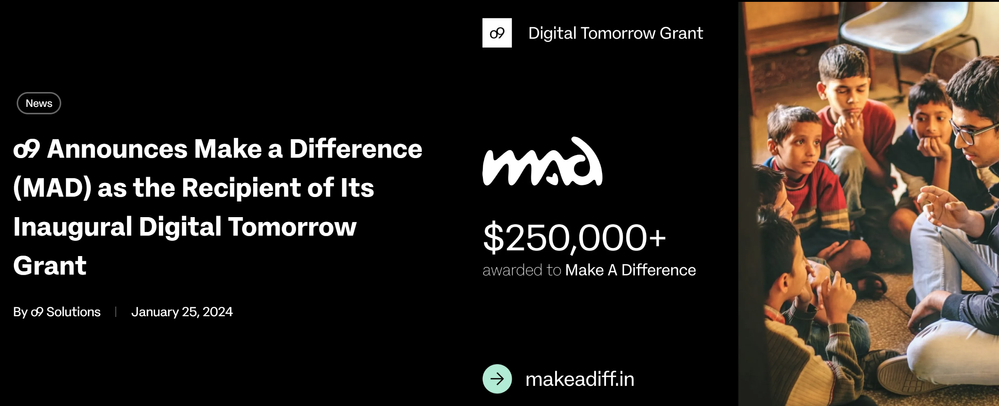
Author: o9 Solutions
Originally posted link is here.
MAD, a prominent India-based nonprofit organization, was selected for its innovative tech-enabled mentorship project
DALLAS, Jan. 25, 2024 – o9, a leading enterprise AI software platform provider for transforming planning and decision-making, today announced that it has selected Make a Difference (MAD), a prominent nonprofit organization in India, as the recipient of its first o9 Digital Tomorrow Grant. This grant will support MAD’s groundbreaking project, Empowering India’s Children: Tech-Enabled Progression Mentoring.
The o9 Digital Tomorrow Grant provides $250,000 to support initiatives that help advance digital literacy and promote technology inclusion for underserved communities. The grant’s intended purpose is to:
-
- Help communities improve digital literacy;
- Enhance and broaden access to technology devices;
- Empower marginalized groups’ use of technology;
- Promote responsible digital citizenship;
- Foster innovation, and;
- Strengthen community engagement.
MAD’s project was selected due to its focus on leveraging technology to provide mentorship opportunities for children in underserved communities through the Progression Mentoring program. The collaboration between o9 and MAD exemplifies a shared commitment to fostering technological inclusion and creating lasting positive impacts on communities. Both organizations aim to contribute to a more inclusive and connected future by supporting similar projects.
“Almost half of the world’s 1.1 billion underprivileged people are children under the age of 18, according to UNDP’s 2023 Global Multidimensional Poverty Index (MPI) Report. MPI defines six years of schooling, but we know that’s only about halfway to the Empowerment Line, which is what MAD aspires to, so that the cycle of intergenerational poverty can be broken within one generation instead of the seven generations it currently takes in countries like India,” said Jithin Thadani, Co-Founder and CEO at Make A Difference. “Tech-based tools that will enable us to deliver all our educational and support interventions and monitor their outcomes for our beneficiaries from 10 years all the way up to 28 years of age are crucial for poverty to be solved at scale. Tech-enablement is also key to our mission of ending poverty in our lifetime by empowering the sector. So, receiving this grant from o9 is doubly meaningful — apart from the funding, we’ve found a global knowledge partner that is unwavering in its support in helping us build the ecosystem-enabling tools we’ve set out to build.”
“Choosing a recipient was a challenging task due to the outstanding applications we received. Make a Difference (MAD) stood out for the organization’s dedication and novel approach, and we believe that its endeavor will contribute significantly to advancing digital literacy in underserved communities,” said Igor Rikalo, President and COO at o9. “MAD’s Tech-Enabled Progression Mentorship program is a testament to its commitment to empowering the next generation, and we are confident that this collaboration will drive positive change in the lives of vulnerable children in India.”
For more information about o9, visit www.o9solutions.com.
About Make A Difference: Founded in 2006 with the singular purpose of permanently breaking the cycle of intergenerational poverty for India’s 35 million Children in urgent Need of Care and Protection (CNCP), Make a Difference (MAD) is an award-winning nonprofit that delivers educational, social, and economic outcomes through a specialized progression mentoring model for institutionalized children in 46 shelter homes and youth from the Care-Leavers Network in 18 cities across India. Over the last 17 years, MAD has grown from 30 volunteers to a network of 20,000 past and present volunteers, many of whom are now important voices within the social impact sector nationally and internationally. It is the only NGO in India that operates solely on a scalable, self-organizing, volunteer-led community model. For more information, please visit www.makeadiff.in










